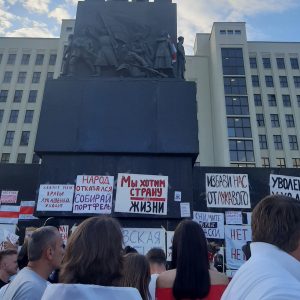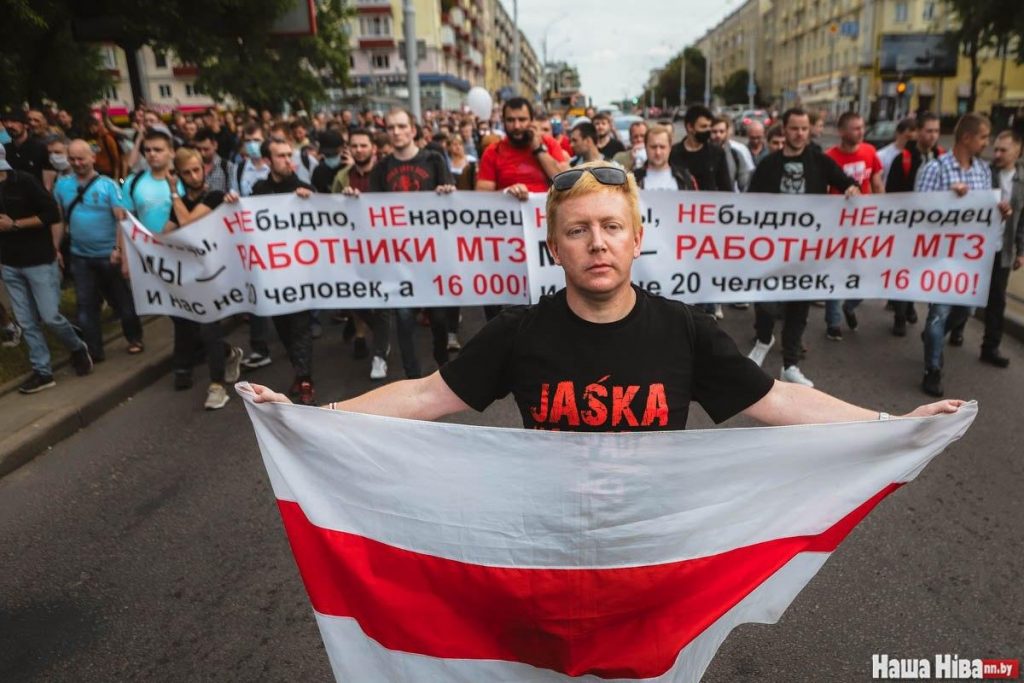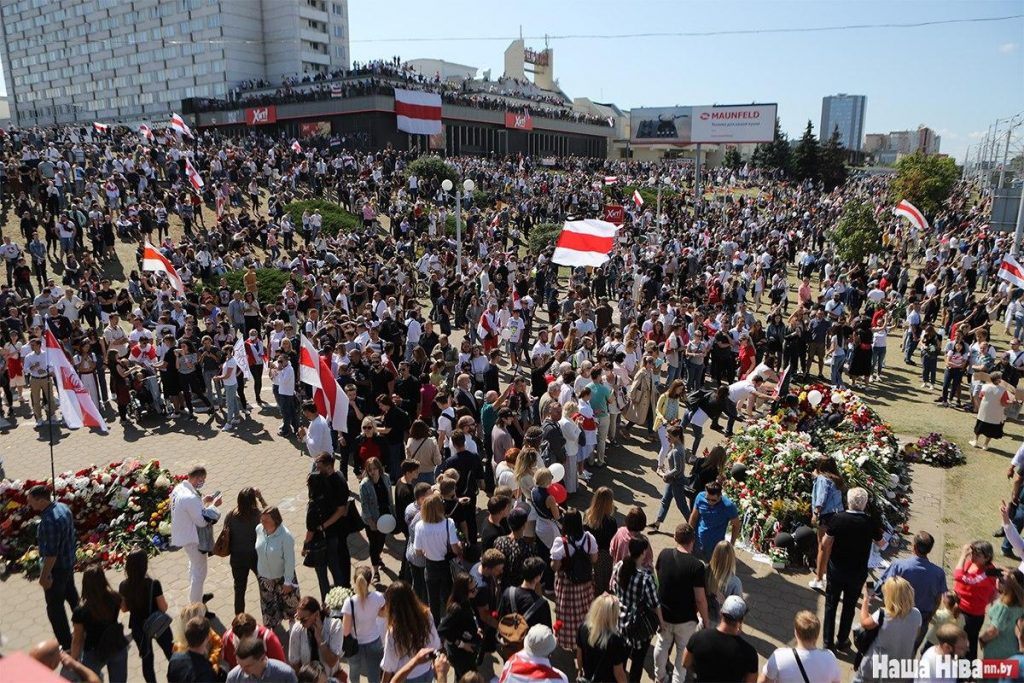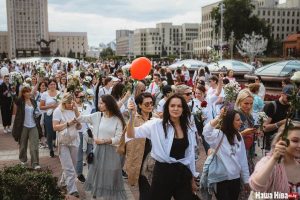The movement of ‘dreamers’ against the ‘one-size-fits-all’ propaganda

Belarus, from its capital and regional centres to its towns and villages, has now been engulfed in anti-government protests for 15 consecutive days. The peaceful March for a New Belarus on 23 August led to Lukashenka parading with a Kalashnikov in his hand and his press service claiming that the protesters ‘sort of stormed’ his residence.
This disinformation rhetoric is not new, with its methods imported from Russia. After the resignation of top Belarusian TV reporters and presenters, Lukashenka invited Russian propaganda experts to replace them. Lacking subtlety and knowledge of the Belarusian political landscape, they have already called Belarus ‘Byelorussia’ and become confused over the spelling of Lukashenka’s famous nickname ‘Batska’ (Dad in Belarusian) bestowed upon him by his supporters.
Video: Lukashenka’s official Telegram channel “Pul Pervogo”
Following the example of Putin’s rallies, the regime’s advisors have tried to demonstrate its own loyal base. For all its absurdity, stories date the extravagant use of taxpayers’ money has not paid off.
Komsomol and party gatherings 2.0
In an attempt to show the undying love of the people on government TV, local authorities were ordered to gather state employees on the main squares. Most of them were threatened with losing their jobs or promised a bonus. Some went out of their own conviction that the demonstrators were willing to ‘destroy the country’ with another ‘Ukrainian scenario’.
Starting with Minsk on 16 August, a historic day for the country that saw the largest peaceful protest in its recent history, the government assembled its own not-so-protesting crowd. Asked whether the gathered supporters want any changes, they would categorically respond ‘No!’, as well as replying ‘None!’ in answer to the reforms they would like to see implemented. Eclipsed in numbers tenfold even by conservative estimates, this rally seemed more like a caricature in comparison to the sea of people marching with their eyes full of hope for change.
Video: tut.by
The pro-government gatherings have continued in other cities, starting with the east regional centres – Homel’ and Mahilou – possibly trying to imply an imaginary divide within this culturally homogeneous country. The authorities have recreated the same scenario throughout the country: people have been transported by bus from the regions, a massive flag has been hung on the local administration building, while a helicopter with a smaller flag flew over the crowd. In Vitsebsk, the creativity went even further and a hot-air balloon became part of the ‘celebration’. TUT.by has estimated that the stage and sound equipment alone would have cost around 5 thousand EUR to the local administrations, with other expenses also adding up to thousands of euros.
Demonstrators’ behaviour has been far from spontaneous: with the dutifully rehearsed chants ‘For Batska!’ they waved flags and held posters provided by the organisers, leaving within a couple of hours by the same buses on which they arrived. The use of Soviet flags and Saint George’s ribbons seemed to be intentionally evoking images of Eastern Ukraine and thoughts of ‘anything but war’ in the minds of TV viewers. The tour continued in Barysau, Babrujsk, Brest, Hrodna and other towns.
‘Dreamers’ or do-nothings?
What about the demonstrations on the other side? Women formed the backbone of the second wave. Outraged by accounts of torture in police custody and loss of life among protesters, they showed once again that the protests were peaceful by using the colour white and flowers as their main symbols, undeterred by the fear of repression.
The movement has been extremely diverse in age and background, comprising factory workers, intellectuals, artists, business people and the wider civil society. ‘One for all, all for one’ has been their common slogan. While this was made famous by Alexandre Dumas in The Three Musketeers, the Belarusian ‘musketeers’ are also a mixed bunch. These days to show the unity of the people, some are using both the historical white-red-white and the current red-green flags. Whether they will be able to agree on the intricacies of domestic or foreign policy is yet to be seen. However, they are certainly against violence and in favour of free and fair elections.
Video: Euroradio
While Lukashenka calls these protesters alcoholics, ‘sheep’ following the orders of foreign puppeteers and drug addicts who cannot hold down a job, the protesters have been turning these words used in an abusive context into another protest chant. At the gatherings, there are now recurring ironic roll calls to check whether all of the above groups are present. The demonstrators have also been known to take off their shoes when stepping on benches, collect up rubbish after the gatherings, and cross the street when the light is green.
Video: Darya Mustafayeva
Branded naive, the opposition Coordination Council’s members have stood their ground and referred to the movement as ‘dreamers’. Given the solidarity within the country and the support by the diaspora from all over the world, a great number of initiatives have been created to help those in need of legal, medical and financial aid.
Two camps or one nation on the verge of change?
On occasion, heated debates have ensued between demonstrators from the two sides, most being rehearsed statements or pure provocation by the authorities, with others being genuine discussions based on years of propaganda. Is it a sign of division within the country? Let us not forget that Belarus is a place where no political debates are held on TV or in parliament. The National Assembly is a rubber-stamp institution, whose members are appointed rather than elected through the spectacle of parliamentary voting.
Since the instruments of representative democracy have been crippled and the votes have been stolen before even being cast, this could allow people the opportunity to express political opinions outside their kitchens. Autocratic regimes rely on the apathy of citizens who see no need to express their views, thus it is a misstep on Lukashenka’s side which no one could have imagined two weeks ago.
The Coordination Council urged the authorities not to divide Belarusians into those carrying white-red-white or red-green flags or into Belarusian-speaking and Russian-speaking, since they are one people who want change.
Though the anti-government and pro-Lukashenka camps disagree on many issues, both chant the same slogan that is difficult to dispute ‘While we are united, we are invincible!’ If Belarusians manage to see beyond the not-so-subtle disinformation and start a constructive dialogue, this mantra may prove to be true.
Darya Mustafayeva
If you think that Belarus Digest should continue its work during this period critical for Belarus, please support our fundraising campaign with a donation.







